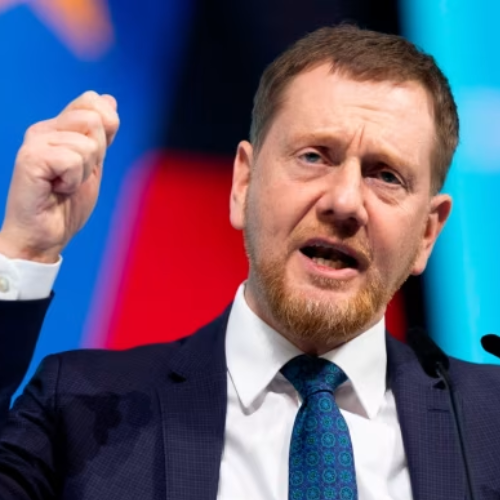A senior German politician, Michael Kretschmer, has raised concerns that the economic sanctions imposed on Russia due to its invasion of Ukraine may be doing more harm to Europe than to Russia itself. The Saxony state premier, who belongs to the Christian Democratic Union (CDU), has suggested that it might be time to rethink these measures. He believes that Europe is feeling the impact of these sanctions more severely than Russian President Vladimir Putin.
According to Kretschmer, keeping the sanctions in place no longer makes sense, especially when the United States appears to be taking a different approach. He stated that when one side suffers more than the other, it is only logical to question whether the strategy is working as intended. His comments have stirred controversy, with some politicians in Germany strongly opposing his views.
Kretschmer’s Remarks Deepen Political Divisions
Kretschmer remarks have led to sharp criticism from several politicians who support Ukraine. Britta Haßelmann, parliamentary co-leader of the Green Party, has urged CDU leader Friedrich Merz to take a firm stance against those advocating for easing sanctions. Critics argue that supporting trade with Russia after its actions in Ukraine would send the wrong message. They warn that lifting sanctions could strengthen Russia while undermining the European Union’s efforts to stand against aggression.
However, Kretschmer’s views are not isolated. Some members of his party, as well as other lawmakers, have also started questioning whether cutting ties with Russia, particularly in the energy sector, is sustainable in the long run. CDU MP Thomas Bareiß acknowledged reports suggesting the potential resurrection of the Nord Stream 2 gas pipeline. He noted that embargoes would eventually be lifted and that gas supplies could resume.
Debate Over Energy Trade Resumes
Germany has long depended on Russian energy supplies, and some politicians believe that economic cooperation should not be ruled out in the future. Recently, discussions have emerged about the potential for resuming economic ties with Russia once peace is restored. Jan Heinisch, a CDU politician leading coalition talks on energy, argued that if a stable and fair peace agreement is reached, there should be room to negotiate gas purchases again.
Dietmar Woidke, the prime minister of Brandenburg and a member of the Social Democratic Party (SPD), also called for a normalization of trade relations with Russia once a peace agreement is in place. He emphasized that economic cooperation could help improve broader diplomatic relations.
As the debate continues, Friedrich Merz, who is widely expected to become Germany’s next chancellor, faces mounting pressure to clarify his stance. With political parties divided on how to handle future relations with Russia, the issue of economic sanctions remains one of the most hotly contested topics in Germany today.


